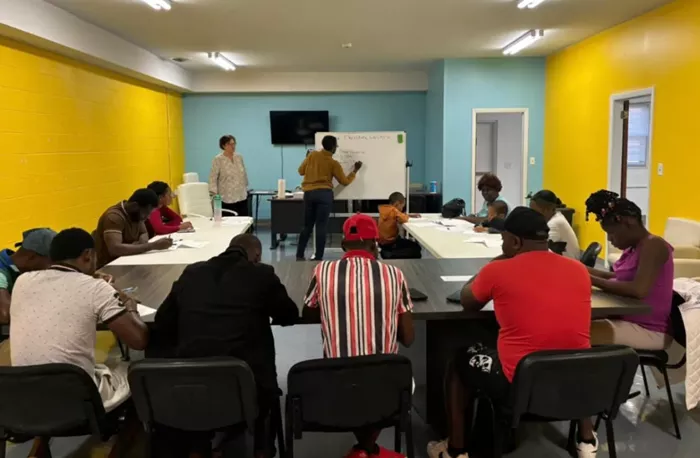In the month since President-elect Donald Trump’s election, his proposed mass deportation campaign has captured widespread media attention. However, many immigrants, particularly those most vulnerable to deportation, are adopting a “wait-and-see” attitude.
“It is what it is,” said Kesnel Tonderau, a Temporary Protected Status (TPS) holder living outside Philadelphia.
Another TPS recipient, a life insurance salesperson based in Boston, shared his outlook via text: “I’m waiting for what’s coming. I count on the LORD!!”
In Florida, Robenson Bernard, another TPS holder, is exploring his options. Ahead of Thanksgiving, he scheduled a consultation with an immigration attorney in North Miami to investigate whether he might qualify for an EB-1 visa, which is granted to individuals with “extraordinary ability.”
Despite early reports suggesting a mass exodus of Haitians after Trump’s election, many immigrants, nonprofit organizations, and advocates seem to be staying calm. Rather than panic, they are focused on adjusting to potential changes and advising individuals to continue with their daily lives for now.
While some cities, such as Indiana and New York, have pledged to cooperate with federal immigration authorities, other cities, including Denver, Philadelphia, and Chicago, are showing resistance. Local institutions, like the Los Angeles school district, have introduced policies opposing mass deportations. These officials argue that such resistance could make federal deportation efforts more expensive to carry out.
Preparing for Uncertainty, Not Fleeing
In October, the Indianapolis City Council passed its 2025 budget, which ensures continued support for programs serving immigrants, including language and leadership development projects.
“My office remains committed to connecting residents and enhancing the quality of life in our community,” said Ruth Morales, Director of the Office of International and Latino Affairs.
Morales emphasized the importance of maintaining strong community relationships, adding, “The biggest thing we’re doing is ensuring that we have those relationships we’ve built over the years.”
Leonce Jean-Baptiste, executive director of the Haitian Association of Indiana (HAINDY), echoed the sentiment. Despite the shifting political landscape, his organization is not yet making major changes. In mid-November, Jean-Baptiste participated in a meeting with local organizations to discuss potential policies affecting the immigrant community. While he acknowledged limited options for response, he saw the meeting as productive.
“We are still working together to position ourselves for whatever comes next,” Jean-Baptiste said.
In Springfield, Ohio—where Trump controversially accused Haitians of eating pets—the Haitian Community Help and Support Center has been expanding its services. The center aims to help Haitians integrate into the community and prepare for future uncertainties, including potential legal changes.
“I think they [left Springfield] because they don’t realize that if something is going to happen, it will happen no matter where you are,” said Viles Dorsainvil, executive director of the center.
Vulnerable New Arrivals
Since 2010, many Haitians have entered the U.S. under various legal programs, such as TPS, the CHNV humanitarian parole (or “Biden Program”), and asylum. TPS, granted to Haitians after the 2010 earthquake, is currently valid through February 2026. It allows recipients to live, work, and attend school without fear of deportation.
The CHNV program, introduced under the Biden administration, allows a limited number of people to enter with a financial sponsor after January 2023, though it is unclear how long participants can remain. Asylum seekers, who fear persecution in their home countries, are also subject to long waits—up to six years in some cases.
Most of the newer arrivals, including those with TPS or seeking asylum, are a small fraction of the 1.5 million Haitians living in the U.S. as legal permanent residents, U.S.-born citizens, or naturalized citizens. Between 2010 and 2022, the number of Haitians in the U.S. grew by 24%, according to the Migration Policy Institute.
Dorsainvil emphasized the importance of educating the community about their rights and legal status. “People need to understand that, if changes occur, they will be ready—not guided by ignorance, but by the facts.”
He also noted that if the administration chooses to revoke TPS, this decision could face legal challenges. Furthermore, even if such a decision is made, it would not be implemented immediately, allowing immigrants to continue their daily lives while advocates work on their behalf.
Related topics:
- Iran Calls on Spain to Extend Visa Validity and Ease Requirements for Traders
- Mainland Visitors to Hong Kong Soar by 28.5% Thanks to New Multiple Visa Scheme
- Trump Pledges to Deport U.S. Citizens Under New Immigration Plan


